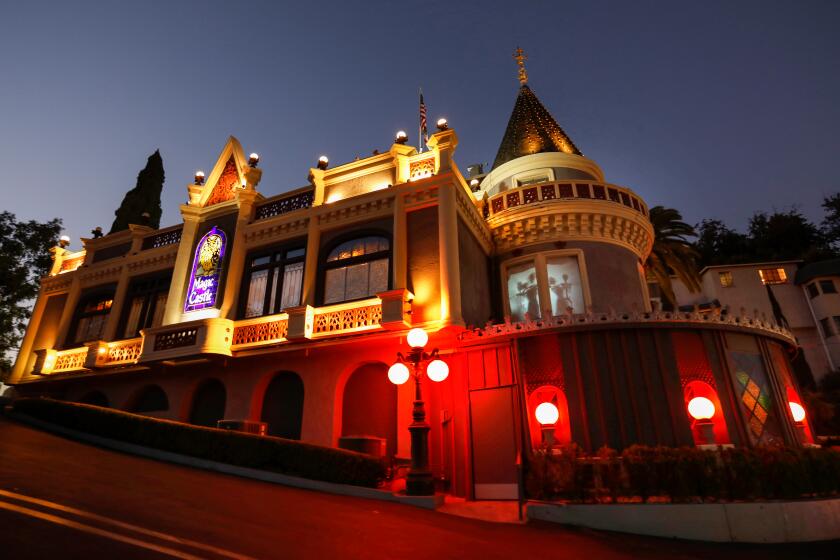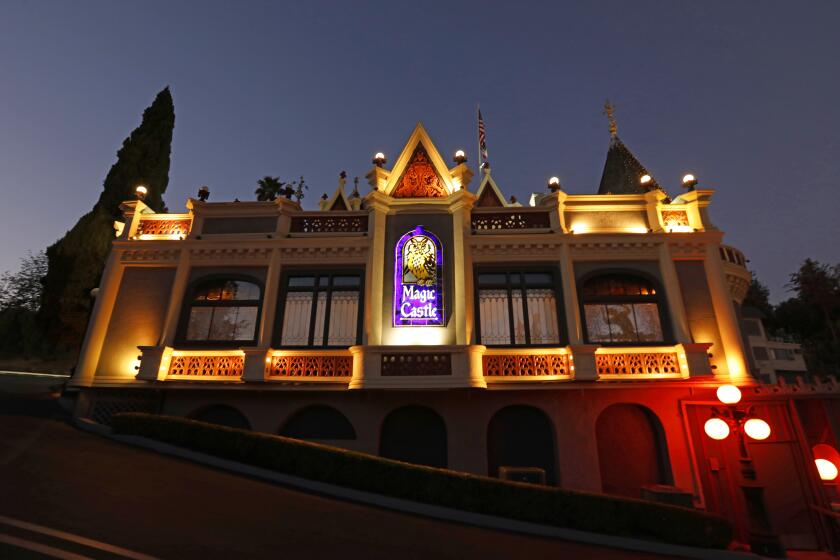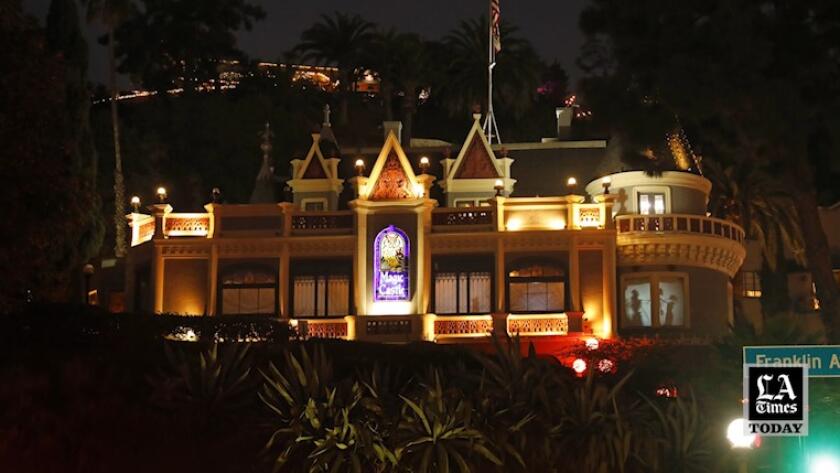Can the Magic Castle be made safe for women? Picking up the pieces after a sex scandal
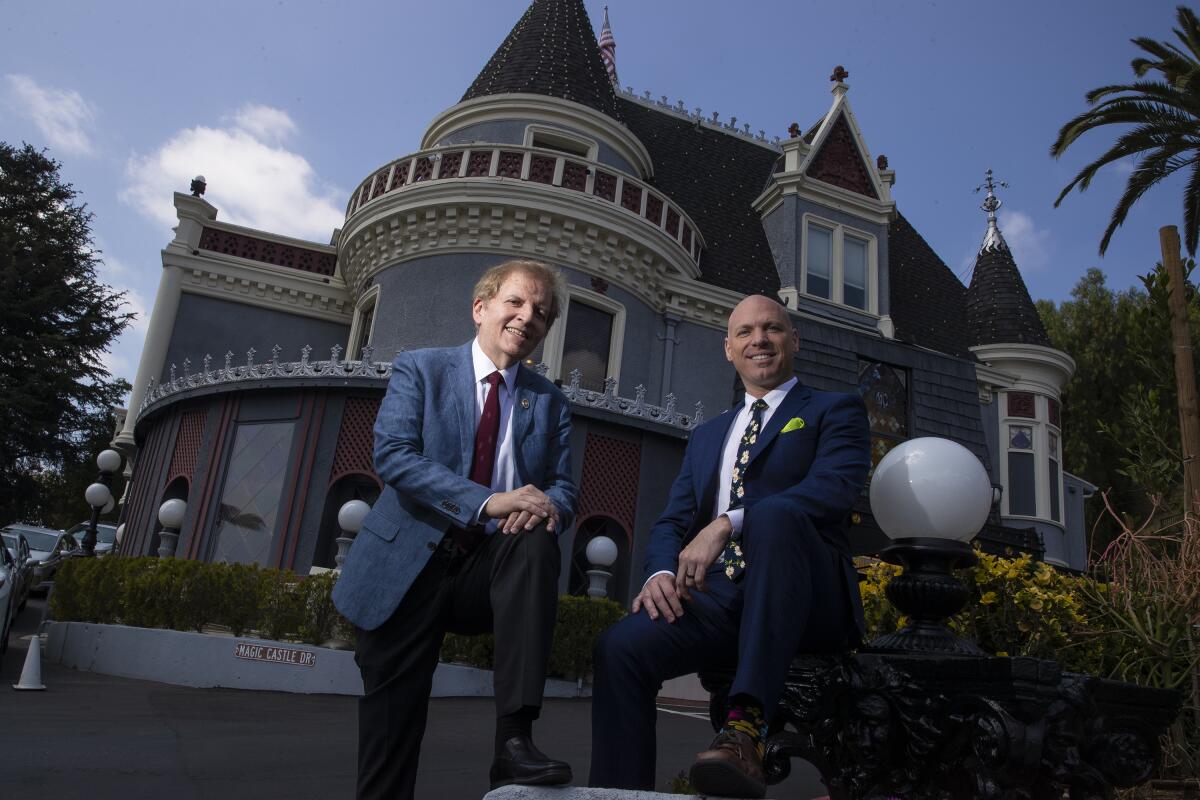
- Share via
Change has come to the Magic Castle after a scandalous stretch — and guests will notice it moments after they enter the storied venue.
For years, there was something of an open secret among the club’s roughly 4,000 members: The central staircase’s slatted railing afforded men at the ground-floor bar an intimate view of women as they ascended the steps.
A 2020 Times investigation, which disclosed an array of claims about bad behavior at the Castle, quoted a magician who said other people joked about “prime seats” from which women could be unwittingly ogled. That report uncovered allegations of sexual misconduct, racism and other issues at the Castle, home to the Academy of Magical Arts, arguably the world’s most prestigious club for magicians and magic enthusiasts.
There was pressure to renovate the venue’s staircase to protect female members and visitors, but also skepticism from those who didn’t think it was a major issue. “If you’re bright enough, and it’s a problem to you, then you don’t walk on that side of the staircase,” Gay Blackstone, chairwoman of the academy’s board of trustees, told The Times in a recent interview. “Common sense.”
Academy leadership eventually opted to install wooden pieces along the railing. The tweak, made ahead of the Castle’s May 2021 reopening — it had closed when the pandemic began — obscured the view from below. Yet some academy members question why it took so long. “The amount of times they told me, ‘No, no, no’ — and then the article came and it got fixed,” said Kayla Drescher, who noted that she’d first pointed out the problem to the organization’s leadership in 2019.
That’s not the only contentious change at the prominent institution, though to many members it’s not yet enough.
In a March election widely seen as a referendum on the previous regime, the academy voted in eight new members to its board of directors, the powerful body that oversees the group’s business affairs. Only one of two incumbents on the ballot was reelected.
The board, which expanded from seven members to nine, is the most diverse in the organization’s history. It now includes people whom academy member Brandon Martinez said he’s “more likely to trust.”
“It signals something different,” he said. “I’m hopeful for change. It’s just, everyone’s tired of holding their breath and hoping for the right things to get done and they’re continuously not done.”
In interviews with The Times, 12 people accused Magic Castle management, performers and others of abuses, as the legendary Hollywood club dedicated to the craft of magical performance wrestles with allegations and membership unrest.
The new board is led by Chuck Martinez, an academy member for more than 40 years and no relation to Brandon Martinez.
“There were problems at the Castle that we’re all aware of — I think that’s very much taken to heart by the entire membership,” Chuck Martinez said. “It sort of speaks for itself that the new board has four women on it, three of whom are officers, [and] it has two gentlemen of color. It really shows a lot of openness to turn the page and create a whole new era for the Castle.”
Leadership may continue to face fallout from the scandal that engulfed the Castle in 2020. Among those accused of misconduct were the venue’s management, staff and performers — as well as academy members. Some of the accusers had been guests at the Hollywood facility and others had worked there. Former employees who sued the academy alleged that complaints to management were not addressed or that they suffered retaliatory actions. The academy’s beleaguered general manager — who’d been the subject of some of those allegations — resigned two weeks after The Times’ report was published.
Last year, the academy settled a lawsuit brought by a former waitress at the club’s restaurant who said she was sexually assaulted by a busboy and fired for raising the issue of the misconduct. But it faces a new lawsuit from another former employee who alleges workplace harassment and wrongful termination, among other claims.
The academy has brought in new management, hiring hospitality veteran Hervé Lévy in June 2021 as general manager and chief operating officer. He faced immediate financial challenges: The group suffered significant losses during the pandemic and membership has declined in recent months. However, the academy’s long-term future in Hollywood was recently solidified when one of the group’s members purchased the Castle property for an undisclosed sum, The Times reported last month. The buyer, video game mogul Randy Pitchford, said then that the Castle, which opened in 1963, would remain the academy’s clubhouse and a magic performance venue.
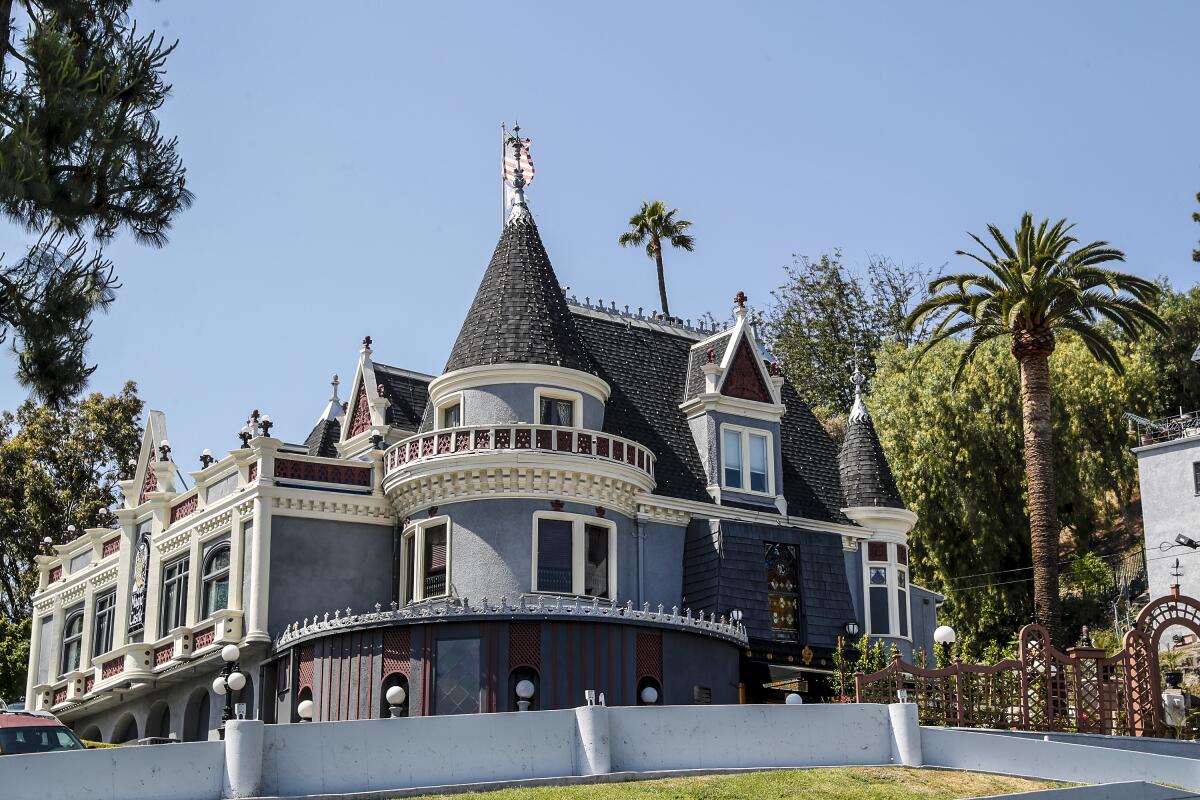
Still, the last few years have been one of the most difficult stretches in the Magic Castle’s history, said Erika Larsen, daughter of the late academy founders Irene and Bill Larsen Jr.
“As far as the institution ... I’m glad that it got shaken up,” she said.
A fresh start
When Lévy began work at the Castle, it became clear to him that the job of transforming the club would be the biggest challenge of his long career in hospitality.
The Frenchman arrived from the Griffin Club, a Cheviot Hills tennis club where he had been general manager and had overseen a significant transformation, from its workplace culture to a $20-million renovation. The experience was formative, but the dysfunction at the Castle and the academy, a nonprofit public benefit corporation, was on another level.
“I was very shocked,” Lévy said. “[I had] never seen such an organization with a lack of system and lack of basic tools.”
Joseph Furlow, general manager of the Academy of Magical Arts, has resigned two weeks after a story by The Times detailed allegations of sexual misconduct, racism and other issues at the Magic Castle, the famed Hollywood club for magicians.
Running the Magic Castle requires catering to two distinct audiences because the facility on Franklin Avenue functions as a clubhouse for academy members but also welcomes the general public. People can visit the club with an invite from a member, by staying at the adjacent Magic Castle Hotel or via banquets and corporate events. (If you want to go badly enough, there’s usually a way.) As such, the venue is a popular tourist attraction — the academy’s aura has been burnished by celebrity members such as Johnny Carson and Cary Grant — though the club’s strict dress code has been known to stymie some would-be visitors.
To improve the operation, Lévy said he overhauled the staff, management structure and leadership style. Among the notable changes, the human resources department was beefed up with the hiring of a new director — a leadership position that previously didn’t exist, Lévy said.
Hiring brought the staff to nearly 160 employees. That’s smaller than the Castle’s pre-COVID-19 staff of 193, 184 of whom were laid off when the venue closed in March 2020, Lévy said.
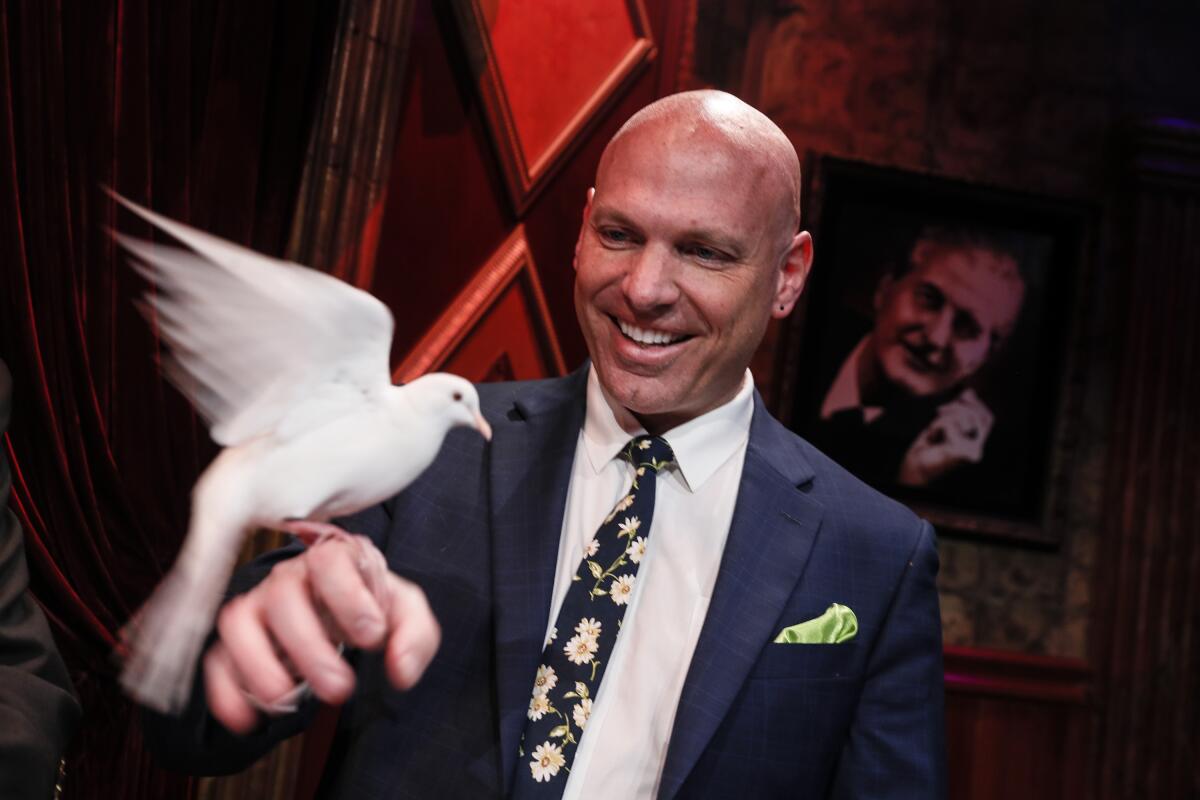
After a strong 2019 that saw the academy generate a profit of about $1.4 million, it lost nearly $900,000 in 2020, according to the academy’s controller. The Castle embarked on a phased reopening last year and lost about $328,000.
Pitchford’s purchase of the Castle and its namesake hotel from a family that had long owned the property is expected to alleviate financial pressure felt by the academy. The group leases the Castle, and for years, it had been building a cash reserve that was earmarked for a purchase of the turreted mansion, which was built as a private home in 1909. But during the pandemic, that money became a lifeline. Cash holdings of $8.46 million fell by about 50% from 2019 to 2021.
“That was going to be the building purchase fund — that ultimately turned out to be the pandemic survival fund,” Chuck Martinez said. “But listen, it saved the Castle.”
The academy will remain a tenant at the Castle, but in Pitchford, who got married at the venue, it has a landlord with a vision for the facility that aligns with the group’s plans.
So far this year, the academy‘s finances have endured an up-and-down stretch: It lost about $194,000 in January amid a closure tied to a COVID-19 surge, but swung to a nearly $6,000 profit in February and an even bigger one in March when it netted roughly $228,000.
The academy has raised dues for both new magician members, whose perks include performing in some areas of the Castle, and new non-magicians, who are given associate memberships. New, local magician members now pay a $2,500 initiation fee and $150 a month, up from a $1,000 initiation fee and $67 a month in 2020, Lévy said. New, local non-magician members pay a $6,000 initiation fee and $225 a month, an increase from $114.50 a month in 2020.
Lévy said smaller monthly increases have been assessed to existing members, though those ranks have thinned, with about 800 of roughly 3,300 not renewing memberships for 2022. Now, the organization has about 2,500 paying members, with an additional 1,500 or so people receiving lifetime or honorary memberships that are free, he said.
Lévy attributed the losses to several factors, including older members who died during the pandemic. He hopes to add 10 to 15 new members a month this year.
Focusing on such gains and not the scandals of the past would be a balm for the new board of directors. “We can ... build for the future and make it something that we’re really proud of,” Chuck Martinez said.
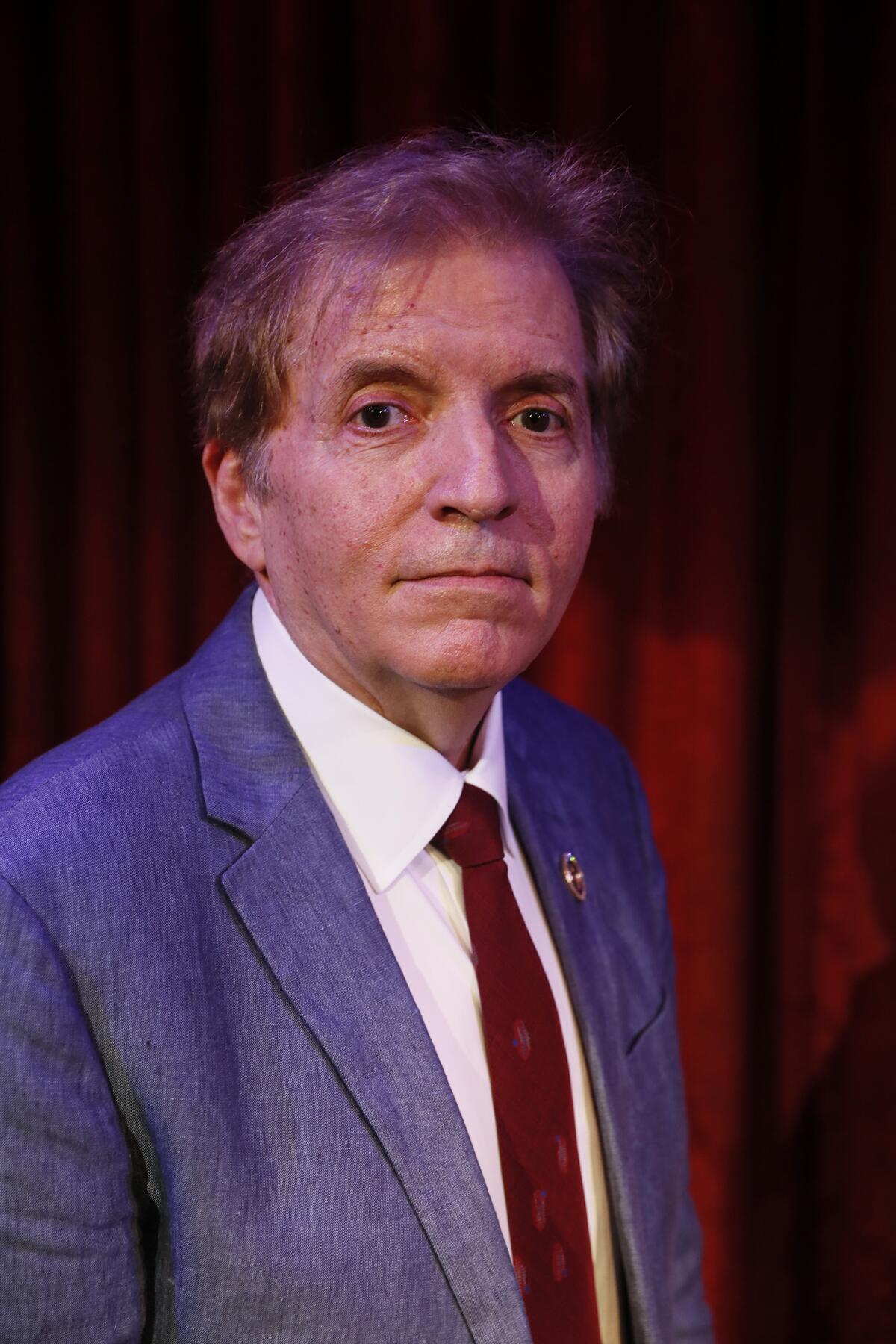
Martinez’s victory came in a board of directors election that was unique from the start. The academy introduced the use of a nominating committee but allowed others to be nominated by petition. According to academy leadership, four members of the previous board sought the committee’s recommendation, but just two — Sara Ballantine and Ralph Shelton — made the cut. Only Ballantine was reelected.
Three members of the previous board of directors did not seek another term, among them its president, Randy Sinnott Jr. An executive at a software company, Sinnott said that the board work, which is done on a volunteer basis, had become too time-consuming.
“Navigating the AMA through the pandemic, and doing this cultural change, recruiting Hervé — all the things we have done over the last few years — have taken thousands of hours of my time,” he said.
Old issues linger
Even as the academy charts a course forward, it is contending with legal issues focused on its past.
A recently settled lawsuit filed by former Magic Castle waitress Stephanie Carpentieri against the academy and two former colleagues revealed a range of alleged misconduct.
Carpentieri alleged in her L.A. County Superior Court lawsuit that management failed to act after she reported multiple sexual assaults by busboy Hector Portillo to her superiors, among them Joseph Furlow, then the general manager. Carpentieri also faced verbal and physical abuse from dining room manager Mikael Hakansson, according to her complaint. Ultimately, she was fired, a termination that the lawsuit alleged was a retaliatory act in response to her disclosing the misconduct.
The academy, Portillo and Hakansson denied the allegations in a court filing. The case was settled in July 2021, legal records show. Terms were not disclosed.
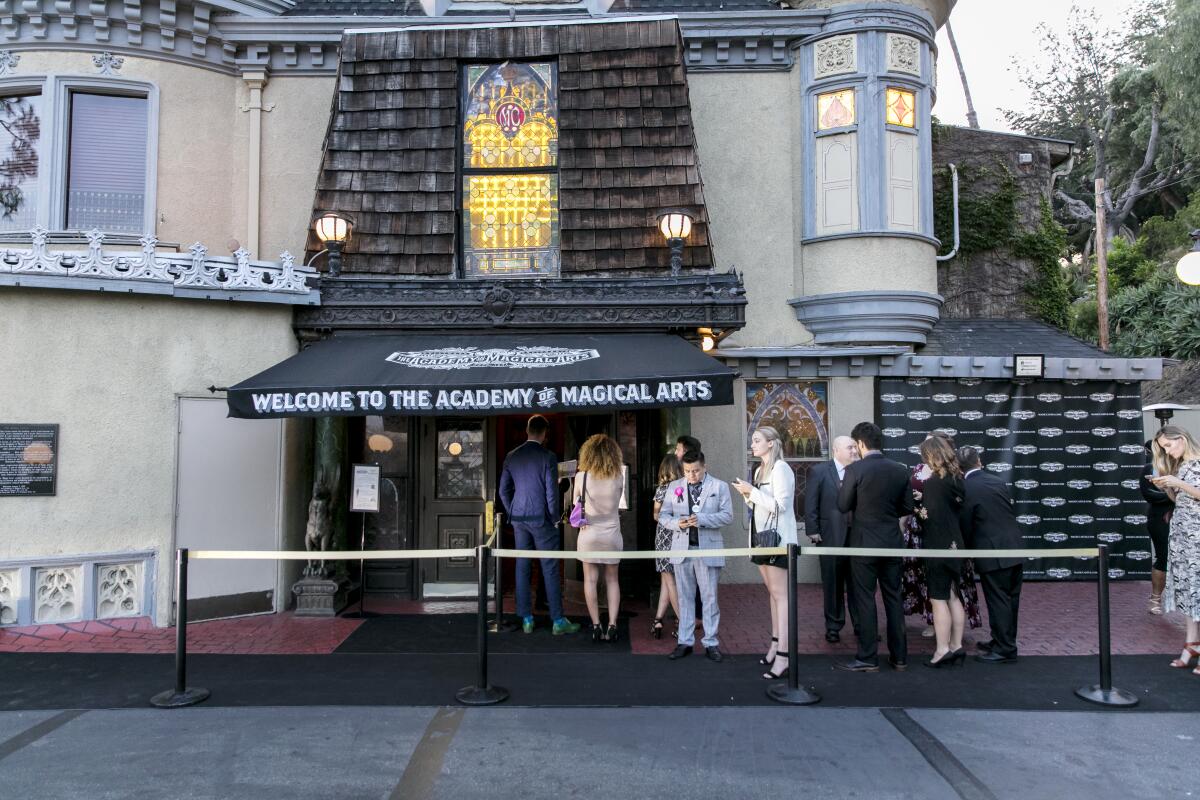
Chuck Martinez and Lévy declined to discuss the lawsuit, saying the alleged conduct in question occurred under previous management. Sinnott declined to comment on the litigation. Lawyers representing defendants Portillo and Hakansson did not respond to requests to interview their clients.
Furlow, who was not a defendant in the case, said in a statement that Carpentieri’s original complaint was taken seriously and investigated.
Carpentieri declined to comment via her attorney, V. James DeSimone.
Still pending is a complaint filed by Patricia Alaskey, who started working at the Magic Castle in 2008, eventually becoming the academy’s membership director. In that role, Alaskey reported to Furlow. But under Furlow — the executive who resigned after publication of The Times’ 2020 report — Alaskey endured sexual harassment and other mistreatment, according to a lawsuit she filed against him and the academy.
In one instance, Alaskey’s June 2021 complaint alleged, Furlow gave her — as a “Secret Santa” present — a Victoria’s Secret lotion gift box, along with a gift card and the instruction to buy her boyfriend “something nice.”
The buyer is Gearbox video game mogul and amateur magician Randy Pitchford, who vows the property will remain the Academy of Magical Arts’ clubhouse and performance venue.
At workplace gatherings, Furlow pressured Alaskey to drink alcohol, telling her it would be “fun” to see her inebriated, the lawsuit alleged. Alaskey resisted, which led Furlow to harass her, it alleged. Alaskey also allegedly endured abuse from an academy member, who once forcibly attempted to kiss her by grabbing her face. This incident occurred in front of Furlow, who only watched “in amusement,” according to the lawsuit, which was filed in L.A. County Superior Court.
Alaskey was let go amid the mass layoffs in 2020, but her lawsuit contends she was actually fired in part because she had reported the claimed mistreatment. She and her attorneys did not respond to requests for comment.
In a court filing, the academy and Furlow denied the allegations. He reiterated that denial in his statement, adding that he is “confident that the facts will reveal themselves moving forward.”
A trial is scheduled for May 2023, court records show. Martinez, Lévy and Sinnott declined to discuss the case.
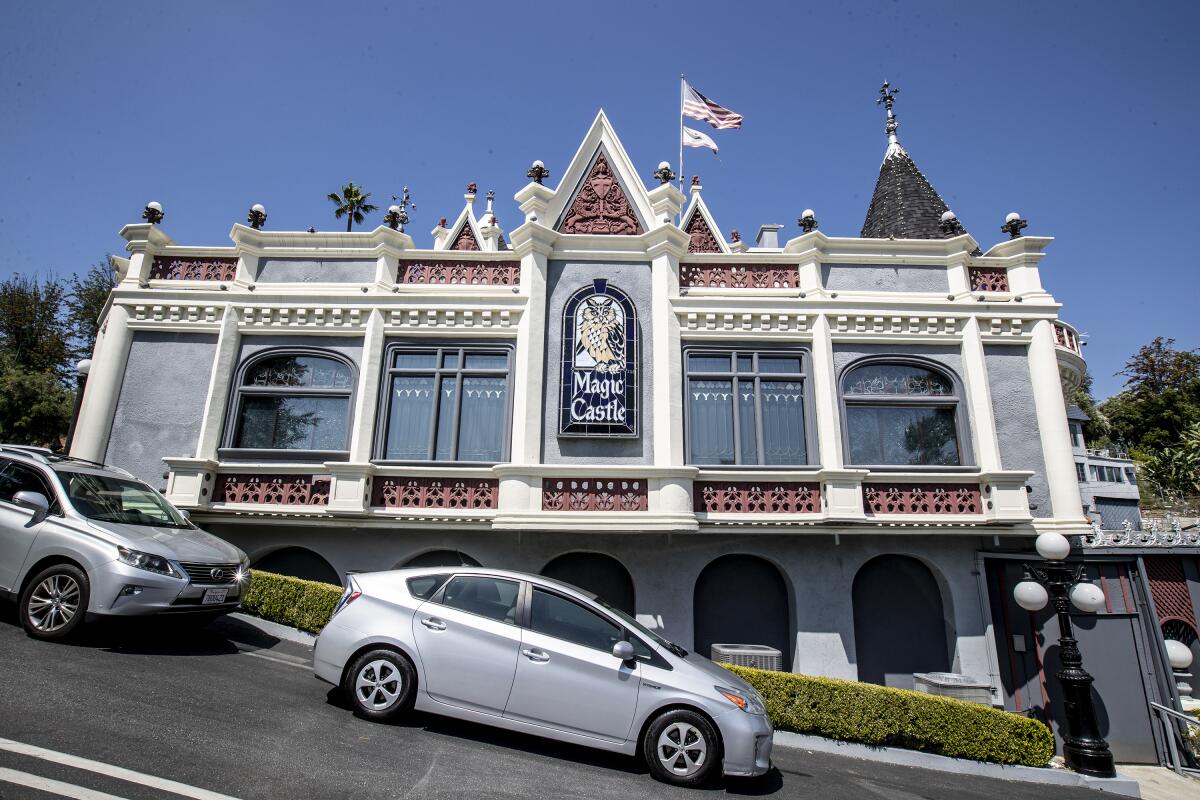
Furlow recently launched a website to tout a yet-to-be-released book about his time at the Castle. It says that the “deliciously scandalous” memoir will reveal “the truth behind the Academy’s sleights of hand,” documenting issues including “inappropriate sex” and “on-site drug use.”
In his statement, Furlow said that the academy had been “on life support” when he started working there, and he prioritized “providing financial stability and improving the overall experience.”
“Any concerns brought up about my management under the direction of the Board of Directors were thoroughly investigated,” Furlow said. “I was cleared of any wrongdoing.”
Questions remain
Several academy members said they are taking a wait-and-see approach to the group’s new leadership. Some pointed to the organization’s board of trustees as a source of their caution.
The recent election also gave members a chance to select new representatives for the board of trustees, which oversees “the magic aspects of the club,” according to the academy’s website. The seven trustees running for reelection faced three challengers, each of whom was defeated.
Among the losing candidates was Paul Draper, who ran a campaign rooted in reform.
Draper said that as part of his platform, he had advocated for training on diversity and inclusion for not only academy leadership but also ordinary members of the group. “I am seeing change in the magic world outside the Magic Castle that is moving quickly, and I look forward to the Magic Castle catching up,” he said.
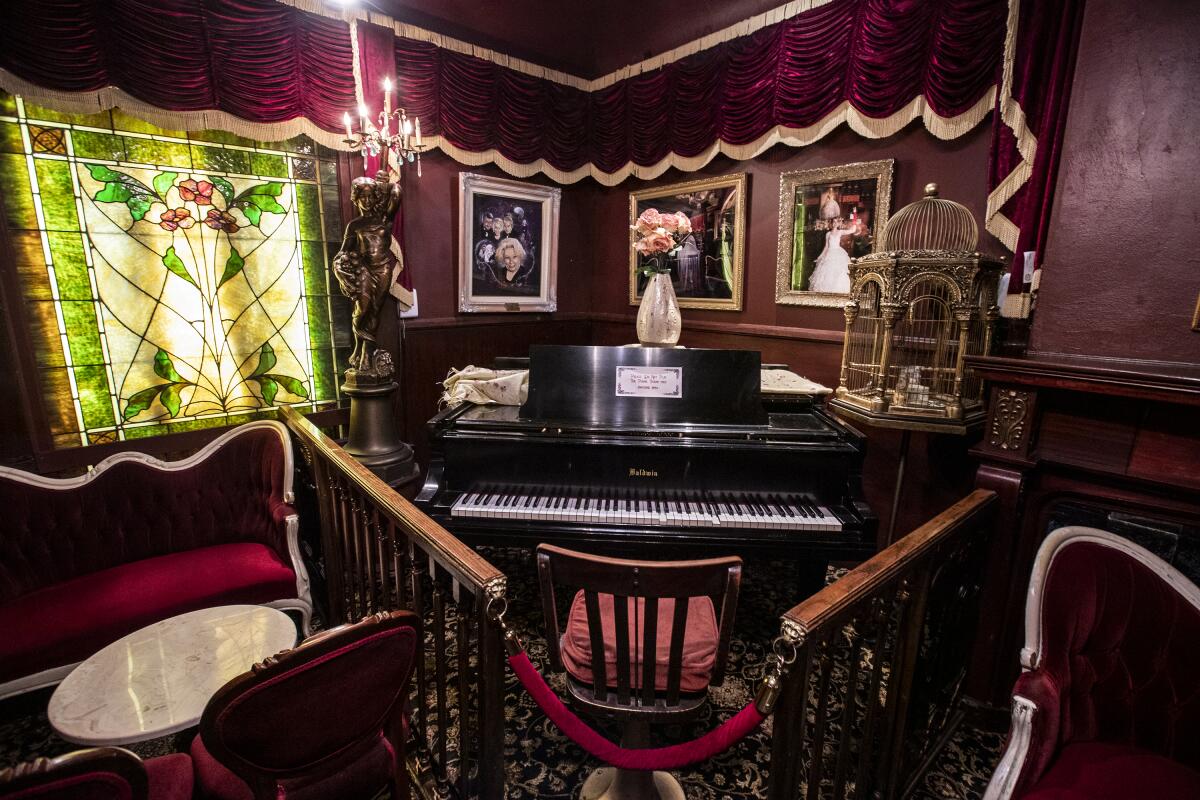
Blackstone said that the board of trustees has recently been engaged in “solving problems we didn’t even know we had.” It has, for example, worked to add photographs and artwork of Black and female magicians to the Castle’s walls. But one of its recent decisions regarding decor has received a mixed response.
For years, some members expressed discomfort with artwork that depicted turn-of-the-century magician Chung Ling Soo. He was a white man named William E. Robinson who pretended to be Chinese, and copied the act of a real Chinese magician named Ching Ling Foo. A 2018 story by the pop culture website A.V. Club labeled Robinson’s act an example of “yellowface” and “a phony, racist Chinese persona.”
Heeding complaints from members, the board of trustees removed one of three pieces of Soo artwork ahead of the Castle’s 2021 reopening, Blackstone said, and added a sign that describes the magician’s life and acknowledges that “ethical concerns loom large from the vantage point of a century later.” Two photographs of Foo, the Chinese magician, were also added to the walls, she said.
One reason the trustees decided to keep some Soo artwork on display, Blackstone said, was that the magician was a “performer of such stature that you can’t ignore him. You can’t pretend. You can’t say, ‘Oh, this person didn’t exist.’”
But some members wondered why any images of him remain. “I don’t see us putting up portraits of comedians who performed in blackface on the walls of any cultural institutions,” Brandon Martinez said.
The rejiggering of the Soo artwork is the sort of reform that some academy members characterized as a half-step toward change, and one they said is emblematic of issues at the Castle. Martinez, for example, pointed to the new sign about the magician. It’s far from critical.
Of Soo, it says: “His knowledge and skill were undeniable.”
- Share via
Watch L.A. Times Today at 7 p.m. on Spectrum News 1 on Channel 1 or live stream on the Spectrum News App. Palos Verdes Peninsula and Orange County viewers can watch on Cox Systems on channel 99.
More to Read
Inside the business of entertainment
The Wide Shot brings you news, analysis and insights on everything from streaming wars to production — and what it all means for the future.
You may occasionally receive promotional content from the Los Angeles Times.

